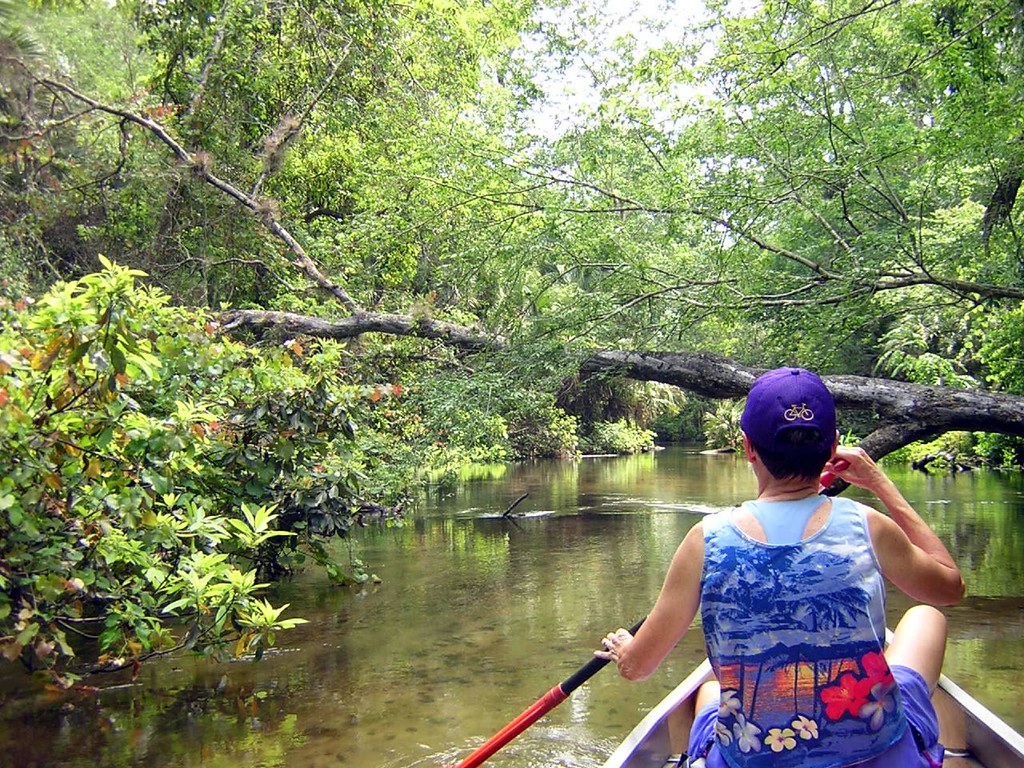How Orange County became the most populous area in the US to recognize rights for nature.
Published in Sierra by Rebecca Renner | Feb 9 2021.
In the summer of 2020, the Little Wekiva River appeared to die. In the span of less than two years, the creek north of downtown Orlando, Florida, had dwindled from the width of a two-lane road to a muddy trickle. Then, in the midst of one of the rainiest hurricane seasons on record, it ran dry. Locals walked the riverbed in befuddled dismay. It was as though the river had simply vanished.
The mysterious disappearance of the Little Wekiva River is an extreme example of the various plagues that bedevil Florida’s waterways. The Little Wekiva is a tributary of the Wekiva River, which is choked by high levels of nitrogen and phosphorus pollution and the accompanying nuisance algae and aquatic weeds. About 1 million pounds of nitrogen from septic tanks, water treatment plants, agricultural waste, and fertilizers on lawns and golf courses leaches into Wekiva basin groundwater each year, and pollution also troubles the nearby Econlockhatchee River. In 2018, toxic algal blooms in both Lake Okeechobee and coastal waters combined to endanger wildlife and local water sources, forcing biologists to measure animal die-offs by the ton.
The Orange County law recognizes a human right to clean water.”
– Thomas Linzey
Then came the November 2020 election—and local citizens’ response to the chronic water pollution. Residents of Orange County, the home of Orlando’s theme parks as well as its biologically rich wetlands, voted to amend their county charter to grant rights to the Econlockhatchee and Wekiva Rivers. The Right to Clean Water Charter Amendment declares that “all Citizens of Orange County have a right to clean water” and that the county’s waterways have a “right to exist, Flow, to be protected against Pollution, and to maintain a healthy ecosystem.”
The election outcome made Orange County the most populous jurisdiction in the United States to recognize legal rights for nature. More than 500,000 people voted yes on the Right to Clean Water Charter Amendment, making this seemingly esoteric legislation, which passed by a landslide margin of 89 to 11 percent, the most popular item on the ballot.
“The Orange County law recognizes a human right to clean water,” says Thomas Linzey, senior legal counsel for the Center for Democratic and Environmental Rights, who has spent much of the past 20 years crafting similar rights-of-nature legislation around the globe.
In 2008, Ecuador rewrote its constitution and included clauses that granted rights to nature—provisions that businesses have since sought to challenge on dozens of occasions but that have survived legal assaults. In 2017, New Zealand passed legislation to grant legal personhood to the Whanganui River, a victory for the Indigenous Māori people, who had spent more than a century fighting for the river’s rights in court. Bolivia, Colombia, and Bangladesh have also established laws recognizing, to various degrees, the rights of nonhuman nature.
But Linzey’s efforts have faced more resistance in the United States, including a federal court striking down Toledo, Ohio’s Lake Erie Bill of Rights. When Linzey gathered with water defenders in a Florida living room in spring 2019, some local environmental activists viewed his legal strategies as a long shot. “I looked at Thomas as a kind of fire extinguisher behind glass,” says Chuck O’Neal, the director of the water-protector group Speak Up Wekiva. “Break in case of emergency.”…
Read the full article in Sierra.
In a post by the Community Environmental Defense Fund, the organization argues that this particular law falls short in a few ways, including failing to go beyond inadequate state laws and excluding immigrants.
Photo credit: “upstream on rock springs run wekiva river fla 2” by ken ratcliff is licensed under CC BY 2.0 .

